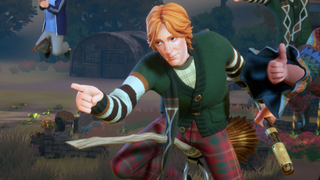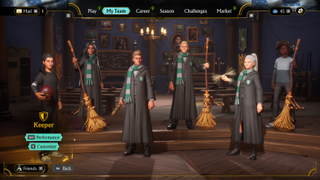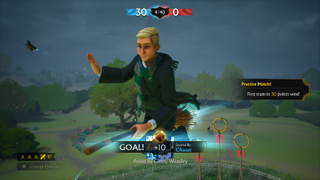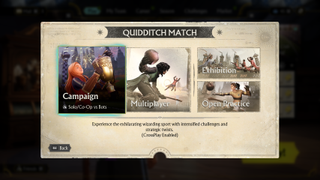Harry Potter: Quidditch Champions currently feels like a sideshow

(Image credit: Future)
After playing some of Harry Potter: Quidditch Champions, my immediate reaction is that this feels like a trial run for the magical game’s inclusion in the likely-upcoming sequel to Hogwarts Legacy. Sure, it probably didn’t start out that way, with my money being on Warner Bros. Games separating out the experiences so they could sell two games to Harry Potter fans instead of just one. Because, you know, money. But following Hogwarts Legacy becoming the best selling game of 2023, I’m not sure a sequel can exist without the inclusion of Quidditch. Their union feels inevitable, as Quidditch would be such an obvious upsell for gamers.
However, if there is going to be Quidditch in Hogwarts Legacy 2, then the experience offered in Harry Potter: Quidditch Champions is going to need some brushing up, as after playing it some I’ve been left feeling a bit overwhelmed by its fun-in-short-bursts but often bamboozling gameplay. Check out the video below to get a sample of how it plays in single player mode. I’ll then list the things I like and dislike about the experience I’ve had so far.

Harry Potter: Quidditch Champions positives
Explainer – Harry Potter: Quidditch Champions does a decent job in breaking down the rather complicated game of Quidditch, giving the player introductory videos and guided gameplay tutorials to each position on the field, be that Chaser, Beater, Keeper or Seeker. This is important as the different positions have unique movesets and abilities. The game automatically thrusts you into these tutorials when you boot up the game.
Mechanics – The basics of gameplay are quite straightforward. You fly around on your broomstick and try to grab the Quaffle (a ball), then either pass it to other team members as you fly up the pitch to the enemy goal, or make a mad dash to score yourself. Provided you aren’t tackled or knocked off your broom, thereby losing the Quaffle, you then attempt to shoot it through one of three goal rings, defended by the opposing team’s keeper. Get it past the keeper and you score. First team to 100 points wins (or the most when the clock runs out).

(Image credit: Future)
Customisation – You can customise each member of your Quidditch team. There’s not a fantastic array of options, but you can choose from a decent amount of faces, hairstyles and colours for things, as well as assign specific outfits and accessories like custom broomsticks. All the traditional Hogwarts school house options are available naturally, so if you want to create a team of Slytherin ne’er-do-wells then you can.
Presentation – The top-level presentation is good, with an excellent and visually appealing main menu screen, from where you can select what type of game you want to play. There are four different game modes to choose from, including Campaign, Multiplayer, Exhibition and Open Practice. Not a bad spread of options if you’re Quidditch mad.
Performance – The game runs smoothly even on older hardware. This is not a demanding game in terms of minimum specs, and I could play the game at 60fps even on an old gaming laptop equipped with a Nvidia GTX 1080 Max-Q. Naturally, on my main Nvidia RTX 3090Ti-equipped rig, the game ran flawlessly at 60fps at 4K.

(Image credit: Future)
Harry Potter: Quidditch Champions negatives
Overload – Even though I completed the tutorials, so far I’ve often found myself overwhelmed by the sheer amount of things happening on screen at any one time. Both full teams of Quidditch players tear around the arena, often in very close proximity, at breakneck speed. While that’s fine and accurate to the fictional game, keeping track of who is who, where the Quaffle is, and who to potentially tackle or pass to, is very taxing.
Directional coloured arrows appearing on the periphery of the screen give a rough idea of the orientation you should be facing, but when there are multiple that potentially require your mental processing, it soon becomes very hectic. And that’s saying nothing of various coloured rings that can be summoned by certain positions on the field in order to boost the speed of team mates. Knowing what is the best course of action for your team is often not clear.
Handling – Handling of characters is tougher than it should be, and I’ve found myself wrestling with the controls too often. This is especially so when looking to quickly shift between positions, such as going from, say, Chaser to Keeper quickly. Picture the scene: An enemy Chaser is bearing down on your goal and, unable to catch them in time, you decide to take manual control of your Keeper in order to block the shot. But to do that, you need to press two buttons quickly and, without having it in muscle memory, it takes just too long to do it consistently. You take control of the Keeper just too late, and the Quaffle flies into your goal.

(Image credit: Future)
Roleplay – Different roles on a team, at least to me, vary in fun factor. I’ve found that I like playing as a Chaser most, as this is closest to the kinetic experience seen in the Harry Potter movies. Playing as the Beater or Keeper, though, just hasn’t clicked for me in terms of fun. As a Beater you’d think using your Bludger (an iron ball used to attack the enemy from distance and potentially knock them off their broomstick) would be fun, but there’s a distinct lack of oomph-factor. Broomstick riders don’t crash to the ground either, as in the movies, but instead magically hover down. It’s a bit weak sauce. My typical experience of playing a Beater so far has been to switch to them and chase after an enemy Chaser in a straight line, get close enough to lock-on my Bludger, then throw it to knock the Quaffle out of their hands or them off their broomstick. Rinse and repeat.

(Image credit: Future)
Seeker – Playing as the hero position role of Seeker, the player on the team responsible for trying to grab the elusive Golden Snitch (a small gold ball with wings that moves around the pitch at great speed), isn’t as fun as it should be. When the Golden Snitch appears (its arrival is announced), you can shift to selecting your Seeker character. As the Seeker, you then have to spot the Golden Snitch on the pitch (actually quite easy in my opinion), and then race against the opponent’s Seeker to grab it. This is achieved by essentially following it as it flies around, flying through small golden rings in its wake to maintain your flight speed, and remaining in its close proximity long enough to press the right trigger button to grab it. There’s not really much more to it than that.
Fun factor – I actually don’t like the game of Quidditch as depicted here that much, and playing this version feels only fun to me in very short bursts, almost as if it would work better as a side-activity in a much larger game set in the Wizarding World. Hmmmm.

(Image credit: Future)
Ok, so there you go. Overall, I feel that even at its lower price point ($29.99/£29.99 on Steam), this game will likely only have real staying power for the truly Quidditch mad. There’s fun to be found here in bursts of short gameplay I’d argue, and especially so if you can do it with a bunch of friends in multiplayer, but the bamboozling and, at times, unrefined control systems, as well as the lack of oomph in key areas means it’s not grabbed me.

(Image credit: Future)
But, just imagine if Quidditch was built into a year-long, open-world adventure in Hogwarts Legacy 2? Not only would there be added narrative built in, thereby imbuing matches with more motive than just, ‘let’s win again guys, I guess’, but there would be much more immersion in my mind. I love the idea of having to sign up and attend Quidditch tryouts to make the team, shop for Quidditch gear myself in Hogsmeade, complete challenges to unlock special moves and, most importantly, dip in and out of playing a game of Quidditch as and when I want. Sounds magical to me.




